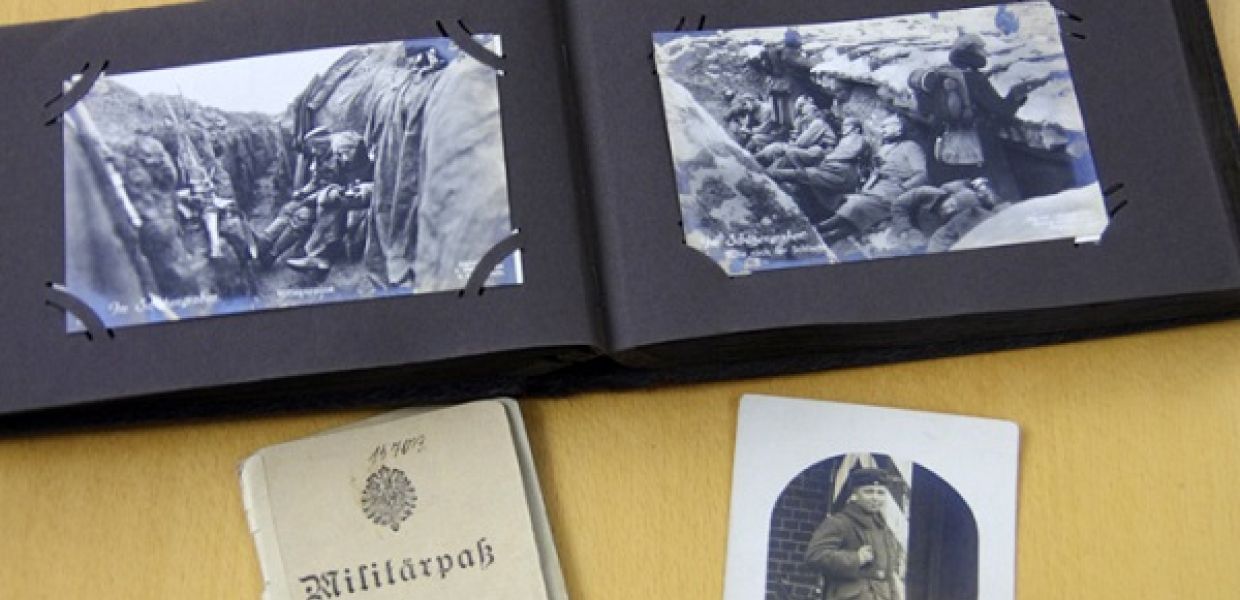MEPs underline importance of memory collection during Shaping Europe event

- Title:
- Europeana
- Copyright:
- CC BY-SA
Without doubt, the First World War at the beginning of the previous century and the fall of the Iron Curtain later greatly influenced the shaping of Europe as it is today. Both historical events have been covered by the Europeana 1914-1918 and Europeana 1989 projects, collecting memories and digitising objects from people all over Europe with the help of Europeana’s partners in each country.
During a unique event at the European Parliament, MEPs and Parliament staff were invited to bring material related to the First World War and share their memories related to the events of 1989. It was the first time that both projects came together at one location, in the year that marks the centenary of WW1 and the 25th anniversary of the fall of the Iron Curtain.
During the collection days on December 2nd and 3rd, several MEPs – including Jávor Benedek from Hungary and Mircea Diaconu from Romania - made contributions to the 89voices.eu project, which aims to collect oral histories related to the events in 1989 and complement Europeana 1989 with audio enhancements. The sound recordings and transcriptions in both English and the original language will be made available via 89voices.eu and Europeana 1989.
#ShapingEurope received a lot of mileage via social media. EU Commissioner for Digital Economy and Society Günther Oettinger tweeted:
Preserving our culture is my priority. I support all projects working on digitising #CulturalHeritage http://t.co/2OY3Dlw5Ie #ShapingEurope
— Günther Oettinger (@GOettingerEU) 2 december 2014
See here for more interesting tweets.
The event - hosted by MEP Sabine Verheyen, MEP Helga Tr?pel, MEP Silvia Costa, MEP Petra Kammerevert and MEP Fernando Maura Barandarián - concluded with a series of speeches by various MEPs and representatives of European cultural institutions, about the importance of culture to the formation of the European Union and Member States’ participation in Europeana 1914-1918 and Europeana 1989. Commissioner Tibor Navracsics, Culture, Education, Youth and Sport, Mr Javier Hernández-Ros, Head of Unit, Creativity, DG CONNECT and Ms Taja Vovk van Gaal, Academic Project Leader, European House of History introduced 'The importance of culture to the formation of the European Union'. The event also featured speeches by key representatives from both Europeana 1914-1918 & Europeana 1989 initiatives from across Europe including Mr Bogdan Andrzej Zdrojewski, MEP and former minister for Culture, Poland; Mr Bruno Racine, Europeana Foundation Chair & Président de la Bibliothèque Nationale de France; Mr Patrick Lefèvre, General Director of the Royal Library of Belgium. MEP Sabine Verheyen, member of Committee on Culture and Education said, ‘Today's event Shaping Europe, Europeana 1914-1918 and Europeana 1989, as well as the digitisation days, which took place yesterday and today, are an opportunity to bridge two major events of the 20th century (WWI and the fall of the Iron Curtain) and highlight Europeana as Europe's cultural heritage platform where memory institutions and users collaborate to show culture in new ways.
‘The digitisation of memories becomes more and more important… as we lose important contemporary witnesses over time. It is our responsibility to make sure that these memories stay alive and that they will still be present for future generations to come.’
Commissioner Tibor Navracsics, Culture, Education, Youth and Sport, said, ‘We have painful experiences but we have happy moments in our common history. Painful experiences of World War One and happy moments of the democratic transitions of the central and eastern European countries. We have to collect those experiences. The painful experiences in order to learn about the problems, so they won’t be repeated. And the happy moments in order to reinforce identity, democracy commitment and our loyalty to the world, the common world of the European nation. ‘The initiative of Europeana to collect all of these stories, build up the history of the everyday life of the 20th century Europe, is an important initiative to build a common European identity, which can be the foundation of the future European Union, can be a foundation of a community on European level and that's why we welcome this initiative and support it.’
Listen to all the speeches on Soundcloud.
The Bibliothèque royale de Belgique, a Europeana partner and active participant in 'Shaping Europe, also organises public collection days for Europeana 1914-1918 on 5-6 December.
